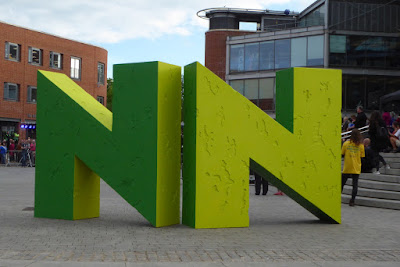The Arts Centre, although being ideally suited as a venue for string quartets, is rarely used for any form of chamber music. This is odd, as it has a proud history of pushing boundaries and promoting an all-encompassing programme, including diverse and eclectic acts. Serious, and classical, music would seem to just dovetail perfectly into their already varied schedule.
I have rushed back from a day on the beach on not only the hottest, but also the longest day of the year, in order to catch what promises to be an intriguing performance.
The Modulus Quartet worked closely in collaboration with six contemporary composers to put together this programme, and each piece is preceded by a brief filmed introduction from the composer themselves. There is no printed programme, and no other introductions from the members of the Quartet, so it pays to listen and glean as much information as possible from these short films. Each piece, whilst very different in style, sets out to challenge the traditional repertoire of the string quartet.
Without Quartet, by Terry Davies, uses music originally written as a quintet for Matthew Bourne's dance company, but is re-worked for four instruments. Whilst still maintaining jazz influences the result takes on a mood reminiscent of a post-war black and white film thriller.
The Golden Road Suite, in three movements, by Eliot Lloyd Stuart is accompanied by some stunning graphics by Tom Brown, abstract shapes and hues of rich yellows projected behind the four musicians. Starting with a Nyman-like arrival, passing through a Landscape of Souls that reminded me of Ilona Sekacz's score to the Dutch film saga Antonia, and completing with The Bittersweet Journey, which opens a repeating phrase inspired by the African bow - the earliest of known stringed instruments, and seems to recall Clint Mansell's soundtrack to The Fountain, The Golden Road Suite is not only my favourite piece from the programme, but also the most life-affirming in its spirit and hope.
Ash Madni's contribution Clarity From Fragmented Memories, manages to fuse elements of Indian and Arabic musical culture into a challenging piece with some interesting pizzicato passages from second violinist Craig Stratton.
Richard Norris' Mumbai Nights is probably the piece most likely to divide audiences. Using a specially recorded bhangra backing tape and news reportage to play over, and a video projection splicing together scenes of Indian daily life, the quartet perform the three movements that tell, in chronological order, events of the 2008 hostage taking in the Indian city. Those who believe that dance music and string quartets should not mix may be horrified. Personally, I loved it, and its factual and well-documented events serving as inspiration and polarising progression from Ash Madni's composition constructed out of memories.
The performance's title draws from a piece by Finnish composer, Veera Lummi, who in turn was inspired by a story told by a Uruguayan musician, who recounted a tale of a remote village without electricity where the only street lighting came once every twelve seconds as the nearby lighthouse beacon swept through. The opposite of this became the inspiration for 12 Seconds of Light. The music, and accompanying video imagery, concentrates on bursts of activity punctuated by short pauses.
Finally, Matthew Slater's experimental piece Memoria Technica brings the performance to a close with a three-sectioned piece that attempts to use sampling and looping of the individuals' playing to be fed back into the performance, allowing each musician a chance to interact with their own playing - a combination of discipline and freedom co-existing within one composition. In the final segment, In Futuro, the piece draws to an end with each member bringing their playing to an end, and with each music stand light individually extinguished until the stage is in darkness. The quartet make their exit as their instruments are still being heard, repeating and fading into the distance like ghostly echoes. Stunningly effective.
Modulus Quartet might like to see themselves as the avant-garde of chamber music, but do not let that put you off, even if your musical tastes usually err on the traditional side of conservative. There is nothing unpleasantly dissonant or aurally challenging in what they choose to do. There are no awkward moments where the artistry is not immediately obvious or sonically coherent. Every moment of the 12 Seconds of Light is filled with absolute beauty and concentrated performance. Even though the composers approach their work from very different points, the meeting place is one of embracement and diversity.
Whether it be in a cave, or a museum, or a medieval church, I urge you to experience 12 Seconds of Light, and allow these four talented musicians, and eight contemporary composers, into your life.
The Modulus Quartet are :
Violin 1 - Jonathan Truscott
Violin 2 - Craig Stratton
Viola - Mircea Belei
Cello - Nick Allen


























